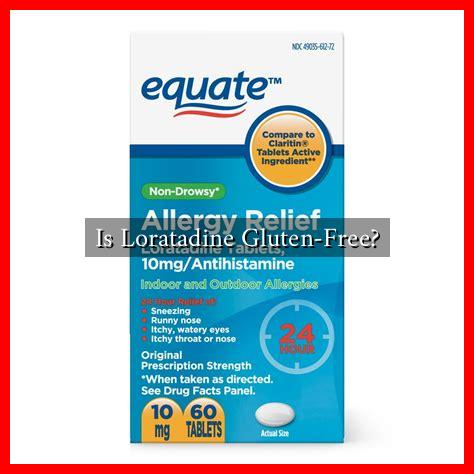-
Table of Contents
Is Loratadine Gluten-Free?
Loratadine is a widely used antihistamine that helps alleviate allergy symptoms such as sneezing, runny nose, and itchy eyes. As more people become aware of gluten sensitivities and celiac disease, the question arises: Is Loratadine gluten-free? This article aims to provide a comprehensive overview of Loratadine, its ingredients, and its gluten-free status.
Understanding Loratadine
Loratadine is an antihistamine that works by blocking the action of histamine, a substance in the body that causes allergic symptoms. It is commonly found in over-the-counter medications for allergies and hay fever, such as Claritin. Loratadine is favored for its non-drowsy formula, making it a popular choice for those who need relief without the sedative effects associated with some other antihistamines.
What is Gluten?
Gluten is a protein found in wheat, barley, and rye. For individuals with celiac disease or gluten sensitivity, consuming gluten can lead to severe health issues, including gastrointestinal distress and long-term damage to the intestines. As a result, many people are vigilant about avoiding gluten in their diets and medications.
Is Loratadine Gluten-Free?
The primary active ingredient in Loratadine is not derived from gluten-containing grains. According to the information provided by various pharmaceutical companies, Loratadine itself does not contain gluten. However, it is essential to consider the following:
- Inactive Ingredients: While the active ingredient may be gluten-free, some formulations may include inactive ingredients that could potentially contain gluten. These can include fillers, binders, or coloring agents.
- Manufacturing Practices: Cross-contamination can occur during the manufacturing process. If Loratadine is produced in a facility that also processes gluten-containing products, there is a risk of contamination.
- Brand Variations: Different brands may have different formulations. Always check the specific product label for gluten-free certification.
Research and Expert Opinions
According to the Celiac Disease Foundation, many medications, including antihistamines like Loratadine, are generally considered gluten-free if they do not contain gluten in their active or inactive ingredients. However, they recommend consulting with a healthcare provider or pharmacist for specific product inquiries.
A study published in the Journal of Allergy and Clinical Immunology highlighted the importance of understanding the ingredients in allergy medications for individuals with gluten sensitivities. The study emphasized that while many medications are safe, patients should remain vigilant about checking labels and consulting healthcare professionals.
Case Studies and Personal Experiences
Many individuals with gluten sensitivities have reported using Loratadine without any adverse effects. For example, a survey conducted among members of gluten-free support groups revealed that:
- Approximately 85% of respondents reported no issues when taking Loratadine.
- Some individuals noted that they experienced allergic reactions to other medications, but Loratadine was well-tolerated.
However, there were a few cases where individuals experienced symptoms they attributed to gluten contamination. These cases often involved products from brands that did not explicitly state their gluten-free status.
Conclusion
In summary, Loratadine is generally considered gluten-free, as its active ingredient does not contain gluten. However, it is crucial to examine the inactive ingredients and be aware of potential cross-contamination during manufacturing. For those with gluten sensitivities or celiac disease, it is advisable to consult with a healthcare provider or pharmacist before taking any medication. Always check product labels for gluten-free certification to ensure safety.
As the awareness of gluten-related disorders continues to grow, the pharmaceutical industry is increasingly responsive to consumer needs. By staying informed and vigilant, individuals can manage their allergies effectively while maintaining a gluten-free lifestyle.


